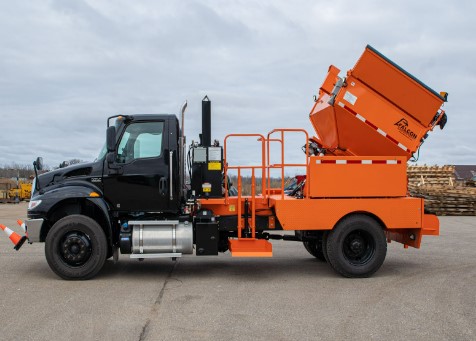Asphalt Patch Trucks offer everything your work crews need to efficiently and effectively perform regular pothole repairs. Unlike a tow-behind trailer, patch trucks can easily navigate city streets which makes them ideal for tight spaces.
A standard patch truck consists of a truck, a hopper, and other essential components. Generally speaking, you will need a Class 6 or greater truck, which is any vehicle weighing between 19,501 lbs and 26,000 lbs.
If you’re in the market for one, you might wonder how much asphalt patch trucks cost. The short answer is that you can expect to pay anywhere between $150,000 to $400,000. The long answer depends on several key factors.
Read on to learn more about key asphalt patch truck pricing factors and how to keep the overall cost down.
CDL Driver
The vast majority of asphalt patch trucks use an auger, conveyor belt, and hydraulics to move asphalt from the hopper to the ground. The problem is that these parts are heavy and cause the truck to exceed 26,000 lbs.
Consequently, most patch trucks require an operator with a commercial driver’s license (CDL). Due in part to the labor shortage, CDL drivers can be extremely challenging to locate and require a fairly large salary. This makes the driver the most expensive aspect of a patch truck over its lifespan.
However, Falcon asphalt patch trucks do not require a CDL driver. Instead of using heavy augers, conveyors, and hydraulics, Falcon patch trucks utilize gravity to move material from the hopper to the ground. As such, anyone with a standard driver’s license can drive and operate one.
The Truck
Asphalt patch trucks come in a wide range of makes, models, and sizes. The bigger the truck and the more material you need to carry, the more expensive it will be. Additional features such as air conditioning and other options can significantly affect the cost.
If you’re on a tight budget, consider purchasing a used truck. But remember that it could require more frequent repairs and maintenance, leading to increased downtime.
Considering the rugged operating conditions most asphalt trucks operate under, it’s not uncommon for a used truck to require an expensive transmission or engine teardown and rebuild. Fuel economy (or lack thereof) can also play a massive role in the lifetime cost.
Components
Most patch trucks utilize a complicated and expensive auger and conveyor system, which moves material from the hopper to the ground. When they break down, it results in costly repairs and two to three weeks of potential downtime.
A Falcon patch truck, however, uses gravity dump instead of an auger and conveyor to move asphalt. As such, you won’t have to worry about expensive repairs or lengthy repair times.
Maintenance
The more components a patch truck has, the more potential for something to break. This is another key advantage of Falcon patch trucks—they’re built with simplicity and durability in mind.
However, like any vehicle, the truck may require maintenance and repairs in the future. For example, if there is a maintenance recall, you’ll need to work with the truck manufacturer or dealership (Ford, etc.) to resolve it.
As such, be sure to perform due diligence when selecting the right make and model for your new patch truck. You can choose from one of seven different brands for a Falcon patch truck:
- Ford F750
- Freightliner M2 106
- Hino 268A
- International MV
- Kenworth T270
- Mack MD6
- Peterbilt 536/7
Alternatively, you can also supply your own truck. However, check with Falcon first to see if it is compatible with our equipment.
Add-ons
Add-on parts and features can exponentially increase the overall cost of a patch truck. You should know exactly what you need for asphalt repair so that you don’t inadvertently choose options you don’t need.
Falcon Asphalt Patch Truck Benefits
A Falcon asphalt patch truck is an excellent investment. In addition to not needing an expensive CDL driver, it offers the following benefits:
- Increased uptime—Thanks to minimal moving parts, you won’t have to worry about the auger or hydraulics breaking down in the future.
- Improved maneuverability—It’s challenging to navigate tight city streets with a trailer. Asphalt patch trucks allow your workers to operate in the city with ease.
- Lower maintenance costs—Augers and conveyors are expensive to repair and even more expensive to replace. Thanks to the gravity dump used by Falcon patch trucks, you won’t have to deal with expensive maintenance or repair costs.
- Improved productivity—You can keep material overnight for use the next day with a Falcon patch truck, eliminating the need for workers to sit in rush-hour traffic or long lines at the asphalt plant. Simply turn the burner up in the morning, and yesterday’s material is ready for today’s shift.
- Increased durability—At Falcon, we build our patch trucks using the same materials as our other highly popular hot boxes. You’ll get the same brand-name components and high-quality materials that make our hot boxes so reliable.
Falcon Patch Trucks Save Time and Money
Falcon patch trucks offer an excellent way to save time and money while performing regular pothole repairs. Click below to learn more about the many available patch truck options we offer.


Recent Comments